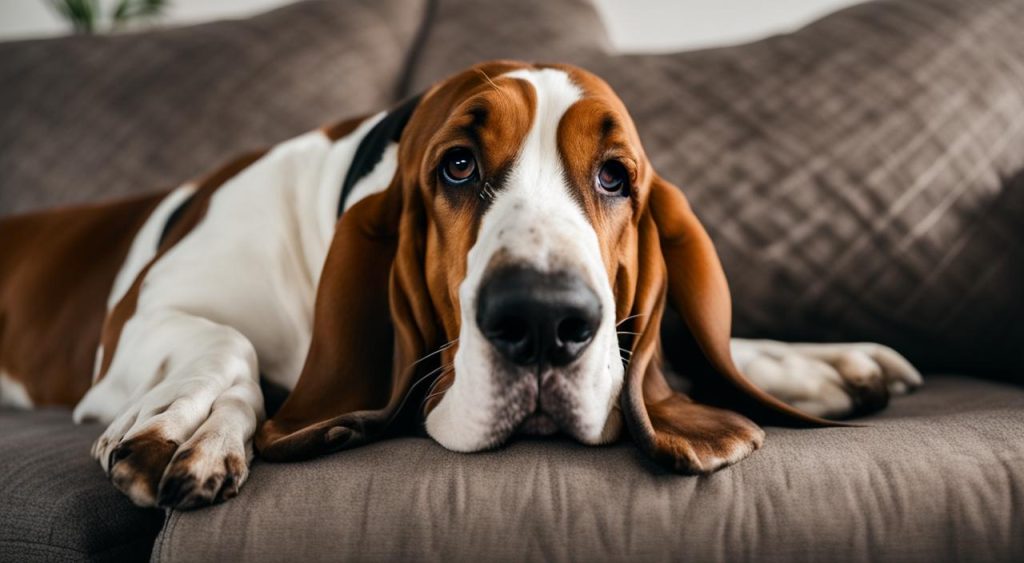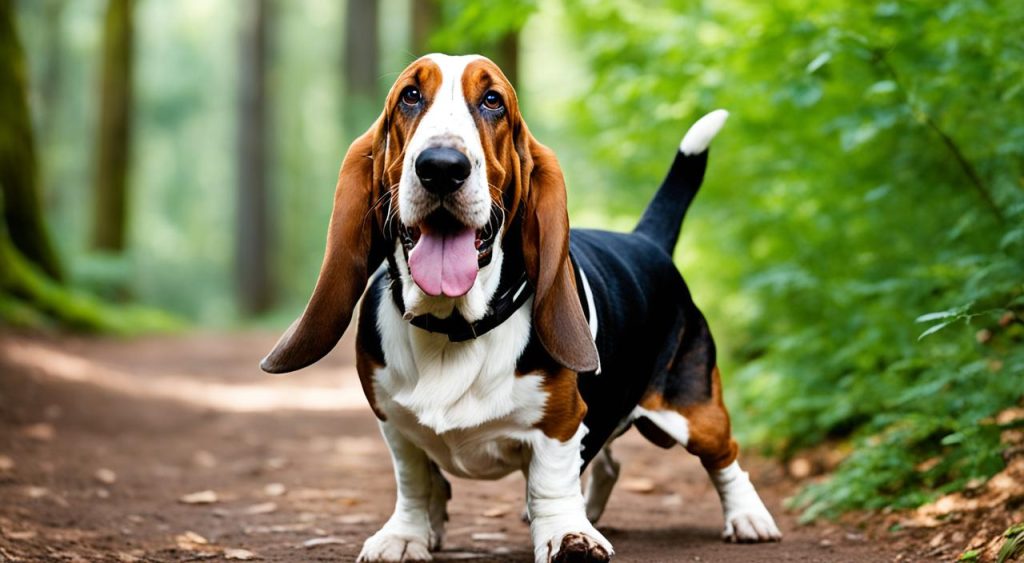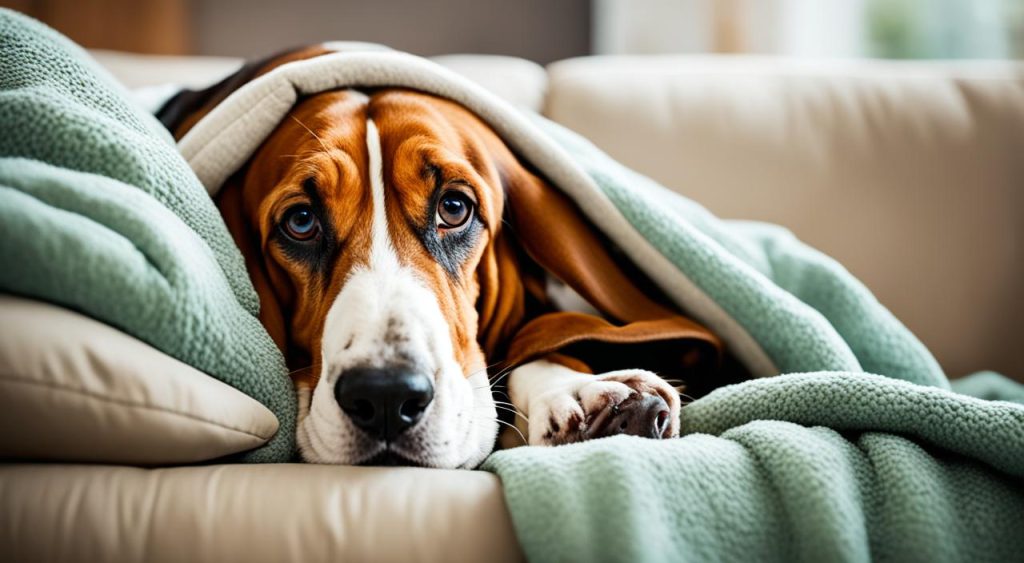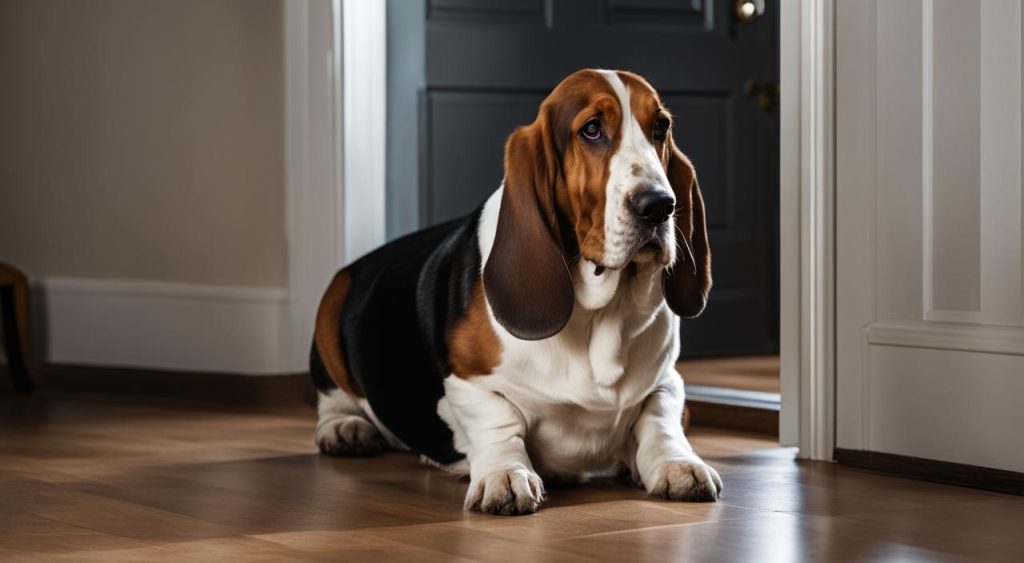Basset Hounds are known for their drooling behavior. While some may joke about the excessive drooling, it is a natural characteristic of the breed. Basset Hounds have loose skin and droopy jowls, which can trap saliva and cause them to drool more than other breeds.
If you’re considering getting a Basset Hound or already have one, understanding their drooling behavior is essential for a harmonious living environment. In this article, we will explore the reasons behind their excessive drooling, as well as tips to manage and reduce it.
Key Takeaways:
- Basset Hounds naturally drool more than other breeds due to their loose skin and droopy jowls.
- Understanding the causes of excessive drooling in Basset Hounds can help owners manage the behavior effectively.
- Proper care and maintenance, including grooming, diet, and regular veterinary check-ups, are crucial for managing drooling.
- Behavioral training and home remedies can also play a role in minimizing drooling in Basset Hounds.
- Being aware of common health issues in Basset Hounds and seeking appropriate veterinary care is essential for overall well-being and drooling management.
Understanding Basset Hounds
Basset Hounds are a unique breed of dogs known for their distinctive appearance and friendly personalities. These lovable canines possess charming characteristics that have made them popular pets among many families. Despite their tendency to drool, Basset Hounds are adored for their calm and patient nature, making them loyal companions in every sense of the word.
Basset Hounds have a number of defining characteristics that set them apart from other breeds. With their long, droopy ears and wrinkled skin, they have an unmistakable appearance that captures the hearts of dog lovers everywhere. But it’s not just their looks that make them special. Basset Hounds are known for their friendly and sociable personalities, which make them great pets for families and individuals alike.
“Basset Hounds have a gentle and friendly temperament, making them wonderful companions for people of all ages.”
These dogs thrive on affection and are always eager to be by your side. Whether it’s cuddling on the couch or accompanying you on a leisurely walk, they are the epitome of loyal companions. Basset Hounds have a natural ability to form strong bonds with their owners and are known for their unwavering loyalty.
While their drooling tendencies may require some extra cleanup, Basset Hound owners will tell you that the joy and love these dogs bring far outweigh any inconvenience. Their friendly personalities and loyal nature make them cherished members of the family.
Causes of Drooling in Basset Hounds
There are several factors that contribute to the excessive drooling in Basset Hounds. Their anatomy, including loose jowls and long ears, can trap saliva and moisture, leading to drooling.
“Basset Hounds have loose skin and droopy jowls, which can trap saliva and cause them to drool more than other breeds.”
In addition to their physiology, certain behavioral factors can also play a role in drooling. Stress, anxiety, and excitement can trigger excessive drooling in Basset Hounds. It is important to create a calm and comfortable environment for them to help reduce drooling episodes.
Furthermore, certain health-related causes can contribute to increased drooling in Basset Hounds. Tooth decay, gum disease, or oral infections can lead to excess salivation and subsequent drooling. Additionally, issues with the salivary glands, such as blockages or infections, can also cause excessive drooling.
“Stress and certain health issues, such as tooth decay or salivary gland problems, can also cause increased drooling.”
Understanding these causes of drooling in Basset Hounds is important for proper management and care of these lovable dogs. By addressing the physiological, behavioral, and health-related factors, it is possible to reduce the frequency and severity of drooling episodes in Basset Hounds.
Basset Hound Care and Drooling
Proper care and maintenance play a crucial role in managing drooling in Basset Hounds. By following a few simple steps, you can minimize their drooling and ensure their overall health and well-being.
Grooming: Regular grooming is essential to keep your Basset Hound clean and reduce drooling. Pay special attention to cleaning their jowls and ears, as these areas are prone to trapping saliva. Regularly wiping their jowls and using a gentle ear cleaning solution can help minimize drooling. This grooming routine not only keeps them comfortable but also helps prevent any potential infections.
Diet and Nutrition: Providing a balanced diet is important for your Basset Hound’s overall health, which can also influence their drooling. Ensure that their diet consists of high-quality, nutritionally balanced dog food. Avoid feeding them table scraps or foods that are known to trigger excessive salivation. Consult with your veterinarian to determine the best diet plan for your Basset Hound’s specific needs.
Veterinary Check-ups: Regular veterinary check-ups are crucial for maintaining your Basset Hound’s health and preventing any underlying conditions that may cause excessive drooling. During these check-ups, your veterinarian will assess their overall health, including their dental hygiene, and address any concerns or issues that may be contributing to the drooling. They may also recommend specific treatments or dietary adjustments to help manage the drooling effectively.
By incorporating these care practices into your Basset Hound’s routine, you can help minimize their drooling and ensure their well-being. Remember, by ensuring proper grooming, providing a nutritious diet, and scheduling regular veterinary check-ups, you are taking important steps towards managing their drooling and keeping them happy and healthy.
Managing Excessive Drooling
Excessive drooling in Basset Hounds can be effectively managed through various strategies, including behavioral training, home remedies, and adjustments to their diet and water consumption.
“Behavioral training is an essential aspect of managing excessive drooling in Basset Hounds. By teaching commands and using distractions, you can redirect their attention and reduce drooling episodes. Consistency and positive reinforcement are key factors in successful behavioral training.”
In addition to training, you can also try simple home remedies to minimize drooling. Regular bathing not only keeps your Basset Hound clean but can also help reduce excessive drooling. Cleaning their jowls with a damp cloth or pet-friendly wipes can also prevent saliva buildup. These remedies can be incorporated into your regular grooming routine to maintain a clean and dry environment.
“Adjustments to your Basset Hound’s diet and water consumption can play a significant role in managing drooling. Feeding them smaller meals throughout the day instead of one large meal can help control excessive saliva production. Additionally, providing access to fresh water at all times but monitoring their intake can prevent excessive drooling.”
By implementing these strategies, you can effectively manage and reduce the occurrence of excessive drooling in Basset Hounds. Consistent behavioral training, regular grooming, and mindful adjustments to their diet and water consumption are key in maintaining a clean and comfortable environment for both you and your drooling Basset Hound.
Common Health Issues in Basset Hounds
Basset Hounds are known for their lovable droopy ears and sad, but adorable, expressions. However, these distinct features can also make them more prone to certain health issues, including ear infections and dental problems.
Ear infections are a common concern for Basset Hound owners. Due to their long and floppy ears, moisture can easily get trapped, leading to the growth of bacteria and yeast. This can result in painful and itchy ear infections. Regular cleaning and maintenance of their ears can help prevent these infections and reduce discomfort.
Dental health is another important aspect of caring for Basset Hounds. Their droopy jowls and loose skin can also contribute to dental problems. The excess saliva and moisture around their mouths can lead to the build-up of plaque and tartar, which can cause gum disease, tooth decay, and bad breath. Regular dental care, including brushing their teeth and providing appropriate chew toys, is crucial in maintaining their oral health.
As a responsible Basset Hound owner, it is essential to be proactive in preventing and managing these health issues. Regularly check your Basset Hound’s ears for any signs of infection, such as redness, swelling, or foul odor. Maintain good dental hygiene by establishing a daily teeth brushing routine and scheduling regular veterinary dental cleanings.
If you notice any symptoms of ear infections or dental problems in your Basset Hound, it is important to seek veterinary care promptly. Early detection and treatment can help prevent further complications and ensure your beloved furry friend stays healthy and happy.
The Basset Hound’s Interaction with Environment
Basset Hounds are adaptable to both indoor living and outdoor activities. They are a breed that requires moderate exercise to maintain their health and well-being. Despite their drooling tendencies, they are generally well-behaved indoors.
However, Basset Hounds also enjoy venturing outside and engaging in outdoor activities. Going for walks, exploring their surroundings, and sniffing around are all part of their innate behaviors.
Understanding their behavior and providing appropriate exercise and stimulation is essential in managing their drooling tendencies. By incorporating regular walks, playtime, and mental stimulation, you can help keep your Basset Hound mentally and physically satisfied.
At the same time, indoor living can still be enjoyable for Basset Hounds. They are known for being calm and patient inside the house, making them suitable for apartment living or homes without large yards.
Remember, each Basset Hound is unique, so it’s important to assess their individual needs and preferences when it comes to both indoor and outdoor activities.
Conclusion
In conclusion, Basset Hounds are known for their drooling tendencies, but there are ways to manage and reduce excessive drooling. By understanding the causes of drooling in Basset Hounds, such as their anatomy and underlying health issues, you can take appropriate measures to minimize drooling.
Proper grooming and dental care are essential for managing drooling. Regularly cleaning your Basset Hound’s jowls and ears can help prevent saliva buildup. Additionally, maintaining a balanced diet and ensuring regular veterinary check-ups can contribute to overall oral health and reduce drooling.
If your Basset Hound’s drooling becomes a concern or seems excessive, it is important to seek professional veterinary attention. A veterinarian can determine if there are any underlying health issues that need to be addressed.
By following these tips and adopting a proactive approach to Basset Hound slobber management, you can maintain a clean and comfortable environment for both you and your beloved drooling companion.





